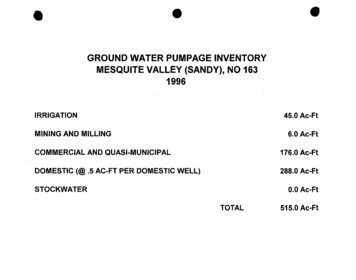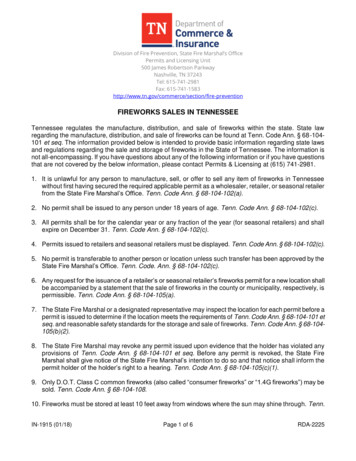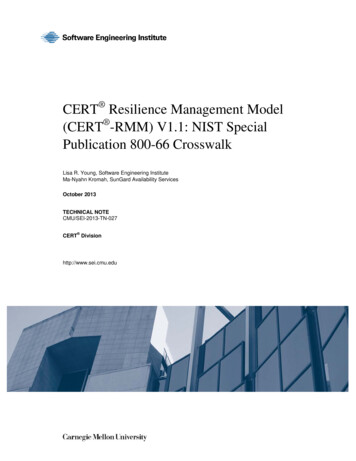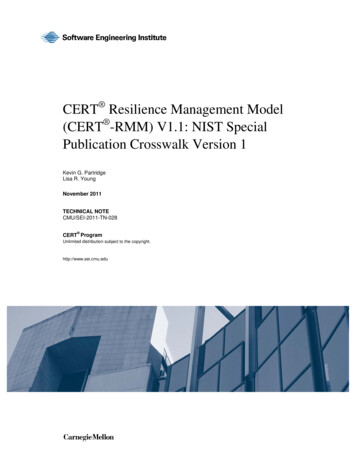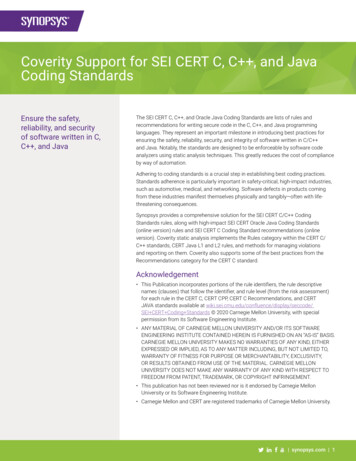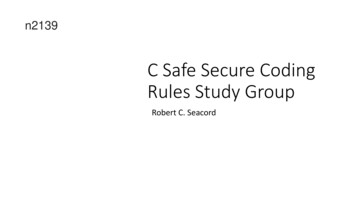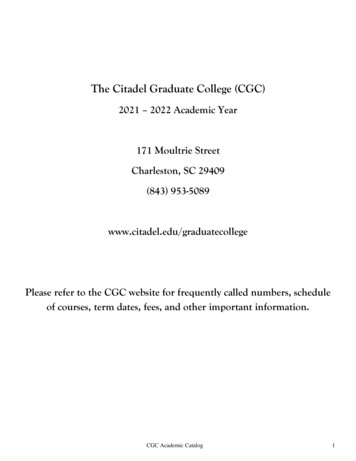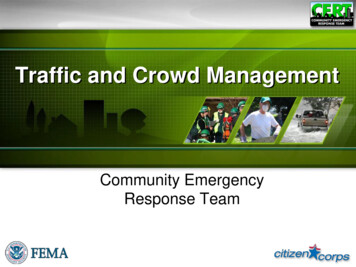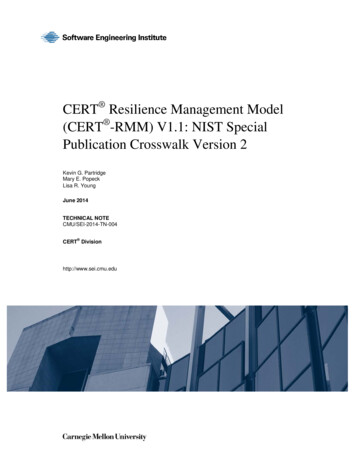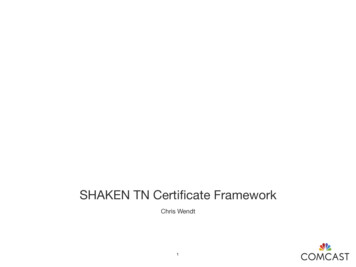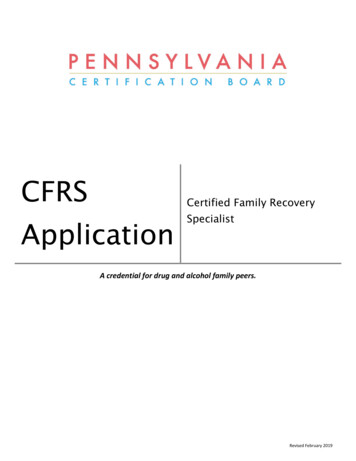
Transcription
CFRSCertified Family RecoveryApplicationSpecialistA credential for drug and alcohol family peers.Revised February 2019
ROLE OF THE CERTIFIED FAMILY RECOVERY SPECIALIST (CFRS)Family recovery is a highly-individualized journey that provides a unique perspective regarding the recovery process. ACFRS understands the stigma associated with substance use disorder and its impact on the family. This recovery journeyis a voluntarily maintained lifestyle that includes the pursuit of spiritual, emotional, mental and physical well-being thatis often supported by others but is not contingent upon the recovery of a loved one(s).The CFRS credential is for adults who have been directly impacted by their own family member or loved one’s substanceuse disorder. The CFRS shares their lived experience with other families to provide recovery support services.CFRS’s are trained to help families move into and through the recovery process. As a CFRS, an individual accepts andagrees that his/her experience will be known by their colleagues, persons served, and others with whom he/she mayshare that they have achieved this credential. Additionally, a CFRS will follow the Code of Ethical Conduct.REQUIREMENTS FOR CFRSATTESTATION: Applicant must attest that they have been impacted by a member of their own family or a loved one’ssubstance use disorder.EDUCATION: 60 hours of training/education including: 24 hours in Family Recovery and Wellness; 12 hours in Advocacyand Support; 6 hours in in Professional Ethics; 6 hours in Confidentiality; and 12 hours specific to substance use disorder. Minimum High School Diploma/GEDThere is no time limit on when training was acquired for initial certificationLETTERS OF REFERENCE/CHARACTER: Applicants must submit three (3) letters of reference/character. Letters may notbe from family members. Letters should show the impact the applicant has made to the field. They should also includehow the applicant practices self-care, how they have developed boundaries and how they work with other families. Theletters of reference/character must be from each of the following areas: personal (1), professional/volunteer (1) andwithin recovery support services (1).STATEMENT OF LIVED EXPERIENCE: Applicants must submit a written statement describing the impact their own familymember or loved one with a substance use disorder had on them, their experience navigating multiple systems;describing how their experience informs their work with other families, what resources they have accessed, and whatfamily recovery means to them. Applicants should also describe how long they have considered themselves in recovery.Written statements must be a minimum of 1000 words.OTHER: Signed attestation (page 3).Signed, dated and notarized Application Acknowledgements (page 10).Applicant must either live or work in PA at time of application.DOMAINS:1.2.3.4.5.CommunicationFamily Recovery and WellnessAdvocacy and SupportCrisis and Safety PlanningEthical Responsibilities, Confidentiality and Professional SkillsFEE: 125 (fee must accompany application and materials)PCB CFRS Application – Revised February 20192
PCB APPLICATION FOR CFRSPlease type or print only.Date:Name:Date of Birth: Male FemaleSSN:Please print your name as it should appear on your certificateHome Address:City:State:Home yer:Name on Transcript:Position/Title:Employer City:Employer Zip:Work Phone:Hire Date:Ext:Hours per Week:Immediate Supervisor:Title:Phone:Email:I attest that I have been directly impacted by another person’s substance use disorder and share lived experience withother families to provide recovery support services.Signature1. Have you ever received any disciplinary action from another certification or licensing authority?If yes, provide full details on a separate sheet.2. Have you ever been convicted of a felony violation in any state or federal law?If yes, please explain in full on a separate sheet. Yes No Yes No3. I understand that if I wish to change my application to a different credential offered by PCB there will be a 50change/review fee required. Yes NoWhy are you pursuing certification?Race (check all that apply): American Indian or Alaska Native Native Hawaiian or Other Pacific Islander Latino Black or African American Asian Hispanic Caucasian Other:What best describes your employment plans for the next 12 months (select one)? Increase hours Retire No change Seek career advancement Move to a different career UnknownPCB CFRS Application – Revised February 2019 Decrease hours3
Fee of 125 can be paid using one of the following:Payment (circle one): Check Money OrderChecks & Money Orders made payable to PCBNumber:-3-digit code:Exp. Date:VISAMasterCardDiscoverName on Card:Billing address:(If different than Home Address)Email address for receipt (if paying by credit card only):TO SUBMIT YOUR APPLICATION, CHOOSE ONE OF THE FOLLOWING:Mail:PCB298 S. Progress AvenueHarrisburg, PA ase allow 5-10 business days for review and processing of your application.To confirm receipt of your application, or check on the status you must email info@pacertboard.org.PCB CFRS Application – Revised February 20194
CFRS CODE OF ETHICAL CONDUCTPREAMBLEThe Pennsylvania Certification Board (referred to herein as "the Board" or "PCB") provides voluntary certification forsubstance abuse and other behavioral health professionals as a way of assuring competence to clients, to the public, andto employers. PCB is dedicated to the principle that individuals in the field of substance abuse and other behavioralhealth services must be held to the highest standards of ethical practice. To that end, the PCB has adopted this Code ofEthical Conduct, to be applied to all professionals certified by or seeking certification by the Board. Individuals aresubject to this Code from the date of application to PCB by the applicant. The Code of Ethical Conduct exists for theprotection of clients.The Board is committed to investigate and sanction those who breach this Code. Certified professionals are, therefore,encouraged to thoroughly familiarize themselves with the Code and to guide their behavior according to the Rules set forthbelow.Transparency or being visible about your professional behavior is paramount to maintaining the high standards set by PCB’scode of ethical conduct and that is expected of certified professionals. Transparency is not an ethical principle but a proethical condition. Transparency is about information and it embodies honesty and open communication. You must bewilling to share information when it is uncomfortable to do so. Transparency is an individual being honest with him/herselfabout the actions they are taking. It means keeping your actions aboveboard. A commitment to transparencydemonstrates to the community, the agency, and the client that there is nothing to hide.All certified professionals will eventually be faced with ethical dilemmas that are difficult to resolve and offer challenges totheir professional practice. Ethical resolution is a critical process and all certified professionals are expected to engage inethical decision-making that includes the evaluation of context of the situation, meaningful values, the appropriate ethicalstandards, is consultative in nature and includes a credible model for ethical decision-making. PCB, through its EthicsCommittee, is available and willing to act in a consultative fashion to answer any questions pertaining to ethical conduct ordilemmas faced by certified professionals.GLOSSARYAppeals Committee: Three PCB board members appointed to hear an appeal.Certified Professional: A person who holds or applies for a PCB credential classification.Client: Any person(s) who, either currently or in the past, has received or is receiving servicesComplainant: A person(s) who files a complaint with PCB against a certified professional under PCB jurisdiction or, inappropriate cases, PCB may initiate an ethics inquiry and act as complainant.Ethics: A standard of behavior by which certified professionals must abide.Ethics Committee: A PCB standing committee charged with the responsibility to review, investigate and sanction asdetermined appropriate to those who breach the Code of Ethical Conduct. The committee is comprised of PCB boardmembers and/or its designees.Hearing Panel: A panel comprised of PCB Ethics Committee members with a responsibility to hear and makerecommendations in accordance with the Code of Ethical Conduct.Hearing Officer: The PCB Ethics Committee Chairperson or Co-Chairperson who presides over an ethics hearing.PCB CFRS Application – Revised February 20195
Counselor Credentials: Associate Addiction Counselor, Certified Associate Addiction Counselor, Certified Alcohol and DrugCounselor, Certified Advanced Alcohol and Drug Counselor.Prevention Credentials: Associate Prevention Specialist, Certified Prevention Specialist.Clinical Supervisor Credential: Certified Clinical Supervisor.Allied Credential: Certified Allied Addiction Practitioner.Case Manager Credentials: Certified Case Manager, Certified Case Manager Supervisor.Criminal Justice Credential: Certified Criminal Justice Addictions Professional.Co-Occurring Credentials: Certified Co-Occurring Disorders Professional, Certified Co-Occurring Disorders ProfessionalDiplomate.Recovery Credentials: Certified Recovery Specialist, Certified Family Recovery Specialist.Intervention Credential: Certified Intervention Professional.Plagiarism: An act of appropriating the language, ideas, or thoughts from another person and representing them as one’sown original work.Public Reprimand: A sanction that is a formal, written, published reproof or warning to a Respondent who the EthicsCommittee has determined to have breached the Code of Ethical Conduct.Respondent: A certified professional against whom an ethical complaint has been filed.Revocation: A sanction resulting in the complete and permanent forfeiture of PCB certification.Score of Services: The range of services deemed appropriate and necessary for an individual client. Such services mayinclude but are not limited to prevention, intervention, outreach, information and referral, detoxification, inpatient oroutpatient, extended care, transitional living, aftercare, recovery support services, and clinical supervision.Suspension: A sanction resulting in the temporary forfeiture of PCB certification for a time-limited period to be determinedby the PCB Ethics Committee.Written Caution: The least restrictive disciplinary action that a Respondent may receive due to breaching the Code of EthicalConduct. This sanction is a formal, private, non-published letter of warning to the Respondent that cautions the Respondentagainst certain conduct or behavior.RULES OF CONDUCTThe following Rules of Conduct, adopted by the PCB, set forth the minimum standards of conduct which all certifiedprofessionals are expected to honor. Failure to comply with an obligation or prohibition set forth in the rules may result indiscipline by the PCB.Discussion sections accompany some of the rules. These discussions are intended to interpret, explain, or illustrate themeaning of the rules, but the rules themselves remain the authoritative standards of the conduct for which disciplinaryaction may be imposed.PCB CFRS Application – Revised February 20196
UNLAWFUL CONDUCTRule 1.1:Once certified, a certified professional shall not be cited, arrested, or convicted for any summary offense,misdemeanor, or felony relating to the individual’s ability to provide substance abuse and other behavioralhealth services or that reflects conduct unbecoming a certified professional as determined by PCB.ROMANTIC/SEXUAL MISCONDUCTRule 2.1A certified professional shall, under no circumstances, engage in romantic/sexual activities orromantic/sexual contact with recovery support service (RSS) recipients, whether such contact is consensualor forced. This prohibition applies to both in person and electronic interactions or relationships.Rule 2.2A certified professional shall not engage in romantic/sexual activities or romantic/sexual contact with RSSrecipients’ relatives or other individuals with whom RSS recipients maintain a close personal relationshipwhen there is a risk of exploitation for potential harm to the recovery support service (RSS) recipient. Thisprohibition applies to both in person and electronic interactions or relationships.Rule 2.3A certified professional shall not engage in romantic/sexual activities or romantic/sexual contact withformer clients because of the potential harm to the client. This prohibition applies to both in person andelectronic interactions or relationships.Rule 2.4A certified professional shall not provide recovery services to individuals with whom they have had a priorromantic/sexual relationship. This prohibition applies to both in person and electronic interactions orrelationships.FRAUD-RELATED CONDUCTRule 3.1An individual shall not use misrepresentation in the procurement of certification or recertification or assistanother in the preparation or procurement of certification or recertification through misrepresentation. Theterm "misrepresentation" includes but is not limited to the misrepresentation of professional qualifications,education, certification, accreditation, affiliations, employment experience, the plagiarism of applicationand recertification materials, or the falsification of references.Rule 3.2An individual shall not use a title designation, credential or license, firm name, letterhead, publication, term,title, or document which states or implies an ability, relationship, or qualification that does not exist and towhich they are not entitled.Rule 3.3A certified professional shall not sign or issue, in their professional capacity, a document or a statement thatthe professional knows or should have known to contain a false or misleading statement.Rule 3.4A certified professional shall not produce, publish, create, or participate in the creation of any false,fraudulent, deceptive, or misleading advertisement.Rule 3.5A certified professional who participates in the writing, editing, or publication of professional papers, mediaresources, brochures or books must act to preserve the integrity of the profession by acknowledging anddocumenting any materials and/or techniques or people (i.e. co-authors, researchers, etc.) used in creatingtheir opinions/papers, books, etc.DUAL RELATIONSHIPS/EXPLOITATION OF RECOVERY SUPPORT SERVICE RECIPIENTSRule 4.1A certified professional shall not initiate, develop, and/or maintain dual or exploitative relationships withRSS recipients and/or family members of RSS recipients.PCB CFRS Application – Revised February 20197
Rule 4.2A certified professional shall not misappropriate property from RSS recipients and/or family members ofRSS recipients.Rule 4.3A certified professional shall not enter or maintain a financial dual relationship that results in financial gainto the certified professional, client or a third party.Rule 4.4A certified professional shall not promote to a RSS recipient for their personal gain any treatment,procedure, product, or service.Rule 4.5A certified professional shall not ask for nor accept gifts or favors from RSS recipients and/or familymembers of RSS recipients.Rule 4.6A certified professional shall not offer, give, or receive commissions, rebates, or any other forms ofremuneration for a RSS recipient referral.PROFESSIONAL STANDARDSRule 5.1A certified professional shall not in any way participate in discrimination on the basis of race, ethnicity,gender, sexual orientation, age, religion, national origin, socio-economic status, political belief, psychiatricor psychological impairment, physical disability, or pathway to recovery.Rule 5.2A certified professional who fails to seek therapy for any psychoactive substance abuse or dependence,psychiatric or psychological impairment, emotional distress, or for any other physical health relatedadversity that interferes with their professional functioning shall be in violation of this rule. Where any suchconditions exist, and impede their ability to function competently, a certified professional must requestinactive status of their PCB credential for medical reasons for as long as necessary.Rule 5.3A certified professional shall meet and comply with all terms, conditions, or limitations of a certification orlicense.Rule 5.4A certified professional shall not perform services outside of their area of training, expertise, competence orscope of practice.Rule 5.5A certified professional shall not reveal confidential information obtained as the result of a professionalrelationship, without the prior written consent from the recipient of services, except as authorized orrequired by law.Rule 5.6The certified professional shall not permit publication of photographs, disclosure of RSS recipient names orrecords, or the nature of services being provided without securing all requisite releases from the RSSrecipient, or parents or legal guardians of the RSS recipients.Rule 5.7The certified professional shall not discontinue professional services to a RSS recipient nor shall theyabandon the RSS recipient without facilitating an appropriate closure of professional services for the RSSrecipient.Rule 5.8A certified professional shall not fail to obtain an appropriate consultation or make an appropriate referralwhen the RSS recipient's problem is beyond their area of training, expertise, competence or scope ofpractice.PCB CFRS Application – Revised February 20198
SAFETY & WELFARERule 6.1A certified professional shall not administer to himself or herself any psychoactive substance to the extentor in such manner as to be dangerous or injurious to a recipient of services, to any other person, or to theextent that such use of any psychoactive substance impairs the ability of the professional to safely andcompetently provide services.Rule 6.2All certified professionals are mandated child abuse reporters.RECORD KEEPINGRule 7.1A certified professional shall not falsify, amend, or knowingly make incorrect entries or fail to make timelyessential entries into the RSS recipient record.ASSISTING UNQUALIFIED/UNLICENSED PRACTICERule 8.1A certified professional shall not refer a RSS recipient to a person that he/she knows or should have knownis not qualified by training, experience, certification, or license to perform the delegated professionalresponsibility.DISCIPLINE IN OTHER JURISDICTIONSRule 9.1A certified professional holding a certification, license, or other authorization to practice issued by anycertification authority or any state, province, territory, tribe, or federal government whose certification orlicense has been suspended, revoked, placed on probation, or other restriction or discipline shall promptlyalert the Board of such disciplinary action.COOPERATION WITH THE BOARDRule 10.1A certified professional shall cooperate in any investigation conducted pursuant to this Code of EthicalConduct and shall not interfere with an investigation or a disciplinary proceeding or attempt to prevent adisciplinary proceeding or other legal action from being filed, prosecuted, or completed. Interferenceattempts may include but are not limited to:1. the willful misrepresentation of facts before the disciplining authority or its authorized representative;2. the use of threats or harassment against, or an inducement to, any RSS recipient or witness to preventthem from providing evidence in a disciplinary proceeding or any other legal action;3. the use of threats or harassment against, or an inducement to, any person to prevent or attempt toprevent a disciplinary proceeding or other legal action from being filed, prosecuted or completed;4. refusing to accept and/or respond to a letter of complaint, allowing a credential to lapse while an ethicscomplaint is pending, or attempting to resign a credential while an ethics complaint is pending.Violation of this rule under these circumstances will result in the immediate and indefinite suspension of thecertified professional’s credential until the ethical complaint is resolved.Rule 10.2A certified professional shall:1. not make a false statement to the PCB or any other disciplinary authority;2. promptly alert colleagues informally to potentially unethical behavior so said colleague could takecorrective action;3. report violations of professional conduct of other certified professionals to the appropriatelicensing/disciplinary authority when he/she knows or should have known that another certifiedprofessional has violated ethical standards and has failed to take corrective action after informalintervention.PCB CFRS Application – Revised February 20199
Rule 10.3A certified professional shall report any uncorrected violation of the Code of Ethical Conduct within 90 daysof alleged violation. Failure to report a violation may be grounds for discipline.Rule 10.4A certified professional with firsthand knowledge of the actions of a respondent or a complainant shallcooperate with the PCB investigation or disciplinary proceeding. Failure or an unwillingness to cooperate inthe PCB investigation or disciplinary proceeding shall be grounds for disciplinary action.Rule 10.5A certified professional shall not file a complaint or provide information to the PCB, which he/she knows orshould have known, is false or misleading.Rule 10.6In submitting information to PCB, a certified professional shall comply with any requirements pertaining tothe disclosure of RSS recipient information established by the federal or state government.PCB CFRS Application – Revised February 201910
CFRS APPLICATION ACKNOWLEDGEMENTSThis page must be completed and notarized and submitted with the application.Please initial each statement below:I have read, and understood the PCB Application Guide for Certification – Non-Reciprocal.I have read, and understood the PCB CFRS Code of Ethics.I either live or work in Pennsylvania at least 51% of the time.I understand that one-half of fee is refundable if application is denied.I understand that my application is open for a period of one year after the date of review. If I fail to fulfill allcertification requirements within that year, the application will be closed and no refund will be issued.I understand that if I request to have my application re-reviewed for another credential PCB offers prior to testing,or after an unsuccessful attempt at the exam I will incur a 50 application change/review fee.I hereby request that PCB grant the credential to me based on the following assurances and documentation:I subscribe to and commit myself to professional conduct in keeping with the PCB Code of Ethical Conduct;I hereby certify that the information given herein is true and complete to the best of my knowledge and belief. Ialso authorize any necessary investigation and the release of information relative to my certification. Falsificationof any records or documents in my application will nullify this application and will result in denial or revocation ofcertification;I consent to the release of information contained in my application and any other pertinent data submitted to orcollected by PCB to officers, members, and staff of the aforementioned Board;I consent to authorize PCB to gather information from third parties regarding continuing education andemployment and understand that such communication shall be treated as confidential;Allegations of ethical misconduct reported to PCB before, during, or after application for certification is made willbe investigated by PCB and could result in the nullification of the application or denial or revocation ofcertification.Applicant Signature: Date:On this the day of , 201 , by mea notary public, the undersigned officer, personally appeared: ,known to me or satisfactorily proven to be the person whose name is subscribed to the within instrument andacknowledged that she/he executed the same for the purposes therein contained. In witness whereof, I hereby set myhand and official seal. Sworn and subscribed before me this day of , 201 .Notary PublicPCB CFRS Application – Revised February 2019SEAL:11
Certified Professional: A person who holds or applies for a PCB credential classification. Client: Any person(s) who, either currently or in the past, has received or is receiving services . Certified Criminal Justice Addictions Professional. Co-Occurring Credentials: Certified Co-Occurring Disorders Professional, Certified Co-Occurring .
